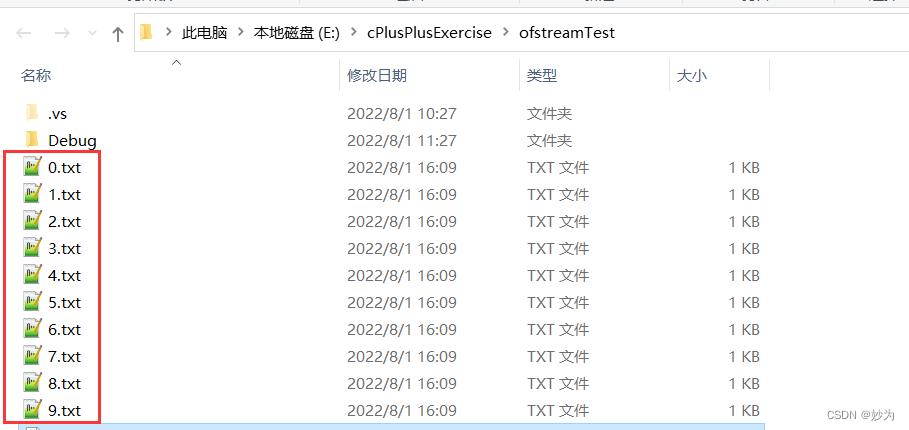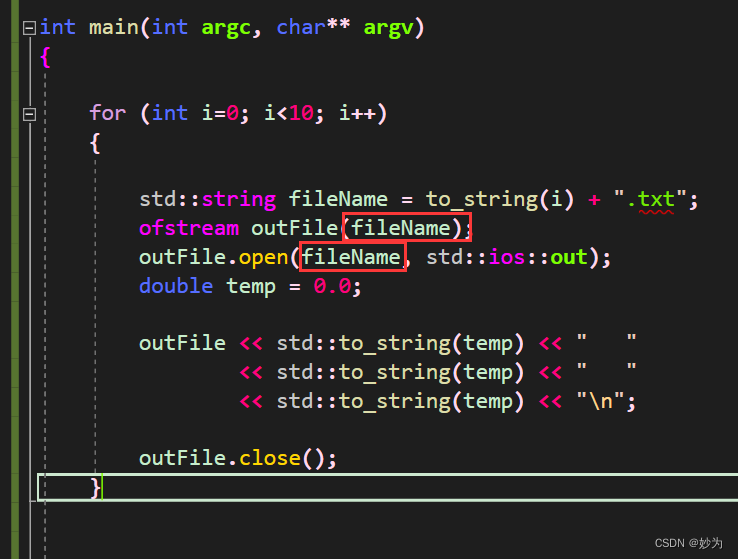系列文章目录
前言
在编程总经常会用到读写文件,基本都是使用ofstream,ifstream,fstream
一、ofstream
写文件
cplusplus.com

#include <fstream>
ofstream //文件写操作 内存写入存储设备
ifstream //文件读操作,存储设备读区到内存中
fstream //读写操作,对打开的文件可进行读写操作

在ofstream类中,成员函数open()实现打开文件的操作,从而将数据流和文件进行关联。下面这段代码依次打开0~9.txt 10个文件
#include<Windows.h>
#include<iostream>
#include<fstream>
#include<map>
#include<omp.h>
#include<string>
#include<vector>
#include<algorithm>
#include<sstream>
#include<gdiplus.h>
using namespace std;
int main(int argc, char** argv)
{
for (int i=0; i<10; i++)
{
ofstream outFile;
std::string fileName = to_string(i) + ".txt";
outFile.open(fileName, std::ios::out);
double temp = 0.0;
outFile << std::to_string(temp) << " "
<< std::to_string(temp) << " "
<< std::to_string(temp) << "\n";
outFile.close();
}
return 0;
}

每个文件输出内容

注意:如果代码写成下面这样:
也就是说:ofstream初始化的时候,不要指定文件,在调用open函数的时候再指定文件名,否则文件中的内容是空的,切记切记。我当时用了一个上午才发现问题,血淋淋的教训啊!!!!
还有就是写完文件记得关闭文件呦

二、ifstream
ifstream:读文件,用法跟ofstream差不多
ifstream fin;
double data;
fin.open(getFilePath() + "\\model\\20210408xiugai.txt");
int k = 0;
while (1)
{
if (fin.eof())
{
break;
}
else
{
fin >> data;
fin >> data;
weather1.vec_AirT.push_back(data);
fin >> data;
weather1.vec_Rh.push_back(data);
fin >> data;
weather1.vec_WindvSpeed.push_back(data);
fin >> data;
weather1.vec_Solar.push_back(data);
//cout << k << endl;
k += 1;
}
}
fin.close();
三、fstream
fstream:可读可写数据,fstream 类为所有内建数据类型以及 std::string 和 std::complex 类型重载 << 和 >> 操作符。下面的例子示范了这些操作符的使用方法:
#include<Windows.h>
#include<iostream>
#include<fstream>
#include<map>
#include<omp.h>
#include<string>
#include<vector>
#include<algorithm>
#include<sstream>
#include<gdiplus.h>
using namespace std;
int main(int argc, char** argv)
{
//fstream写数据
for (int i=0; i<10; i++)
{
std::string fileName = to_string(i) + ".txt";
fstream inOutFile;
inOutFile.open(fileName, std::ios::out | std::ios::in | std::ios::trunc);
double temp = i + 10;
inOutFile << std::to_string(temp) << " "
<< std::to_string(temp) << " "
<< std::to_string(temp) << "\n";
inOutFile.close();
}
//fstream读数据
for (int i=0; i<10; i++)
{
std::string fileName = to_string(i) + ".txt";
fstream inOutFile;
inOutFile.open(fileName, std::ios::out | std::ios::in);
double temp = 0;
inOutFile >> temp;
inOutFile.close();
}
return 0;
}